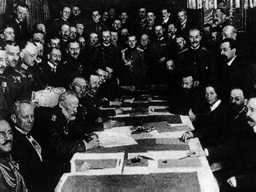 Members of Parliament debating the Waitangi Principles today
Members of Parliament debating the Waitangi Principles todayNZ's Parliament today voted to remove all references to the Treaty of Waitangi from NZ law and replace them with references to the principle behind the Treaty of Brest-Litovsk. The Brest Litovsk treaty, through which Russia made peace with Germany, Austria-Hungary and Turkey in 1917 was described by supporters of the new bill as more appropriate to the NZ situation.
New Zealand First spokesperson Doug Woolerton who introduced the Bill said that the Waitangi Principles were confusing and complicated while the principle behind the Brest-Litovsk Treaty was simple. "Basically the principle of those who signed Brest Litovsk was 'bugger the treaty.' Woolerton told the Kiwi Herald
"When the Germans and their mates signed the peace agreement with Russia they had no intention of keeping to it. Within about three months the Turks invaded part of Russia and over the next few years it was bloody near a free for all."
Woolerton went on to explain that having "bugger the treaty" at the heart of New Zealand law would make life much simpler and would more accurately represent the intentions of the Europeans who signed the Waitangi treaty in 1840.
"In a funny way adopting the principle behind the Brest Litovsk Treaty as the basis for NZ law honours our European forebears."


No comments:
Post a Comment